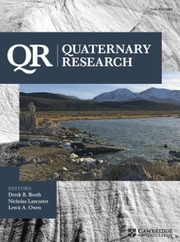Crossref Citations
This article has been cited by the following publications. This list is generated based on data provided by
Crossref.
Kohfeld, Karen E
and
Harrison, Sandy P
2001.
DIRTMAP: the geological record of dust.
Earth-Science Reviews,
Vol. 54,
Issue. 1-3,
p.
81.
VanCuren, Richard A.
and
Cahill, Thomas A.
2002.
Asian aerosols in North America: Frequency and concentration of fine dust.
Journal of Geophysical Research: Atmospheres,
Vol. 107,
Issue. D24,
Wolfe, Alexander P.
2002.
Climate modulates the acidity of Arctic lakes on millennial time scales.
Geology,
Vol. 30,
Issue. 3,
p.
215.
Fisher, David A.
Koerner, Roy M.
Zielinski, Gregory A.
Wake, Cameron P.
Zdanowicz, Christian M.
Bourgeois, Jocelyne C.
Mayewski, Paul A.
and
Grummet, Nancy
2002.
The effects of flowline length evolution on chemistry–δ18O profiles from Penny Ice Cap, Baffin Island, Canada.
Annals of Glaciology,
Vol. 35,
Issue. ,
p.
150.
Gowan, Suzanne Mc
Ryves, David B.
and
Anderson, N. John
2003.
Holocene records of effective precipitation in West Greenland.
The Holocene,
Vol. 13,
Issue. 2,
p.
239.
Ruth, Urs
Wagenbach, Dietmar
Steffensen, Jørgen P.
and
Bigler, Matthias
2003.
Continuous record of microparticle concentration and size distribution in the central Greenland NGRIP ice core during the last glacial period.
Journal of Geophysical Research: Atmospheres,
Vol. 108,
Issue. D3,
Offer, Zvi Y
and
Goossens, Dirk
2004.
Thirteen years of aeolian dust dynamics in a desert region (Negev desert, Israel): analysis of horizontal and vertical dust flux, vertical dust distribution and dust grain size.
Journal of Arid Environments,
Vol. 57,
Issue. 1,
p.
117.
Frenzel, Burkhard
2005.
Progress in Botany.
Vol. 66,
Issue. ,
p.
409.
Ayling, Bridget F.
and
McGowan, Hamish A.
2006.
Niveo-eolian Sediment Deposits in Coastal South Victoria Land, Antarctica: Indicators of Regional Variability in Weather and Climate.
Arctic, Antarctic, and Alpine Research,
Vol. 38,
Issue. 3,
p.
313.
Keatley, Bronwyn E.
Douglas, Marianne S.V.
and
Smol, John P.
2006.
Early-20th Century Environmental Changes Inferred Using Subfossil Diatoms from a Small Pond on Melville Island, N.W.T., Canadian High Arctic.
Hydrobiologia,
Vol. 553,
Issue. 1,
p.
15.
Sapkota, Atindra
Cheburkin, Andriy K.
Bonani, Georges
and
Shotyk, William
2007.
Six millennia of atmospheric dust deposition in southern South America (Isla Navarino, Chile).
The Holocene,
Vol. 17,
Issue. 5,
p.
561.
Xu, Jianzhong
Hou, Shugui
Qin, Dahe
Kang, Shichang
Ren, Jiawen
and
Ming, Jing
2007.
Dust storm activity over the Tibetan Plateau recorded by a shallow ice core from the north slope of Mt. Qomolangma (Everest), Tibet‐Himal region.
Geophysical Research Letters,
Vol. 34,
Issue. 17,
Sachs, Julian P.
2007.
Cooling of Northwest Atlantic slope waters during the Holocene.
Geophysical Research Letters,
Vol. 34,
Issue. 3,
Friesen, T. Max
2010.
Dynamic Inuit Social Strategies in Changing Environments: A Long-Term Perspective.
Geografisk Tidsskrift-Danish Journal of Geography,
Vol. 110,
Issue. 2,
p.
215.
Prospero, Joseph M.
Bullard, Joanna E.
and
Hodgkins, Richard
2012.
High-Latitude Dust Over the North Atlantic: Inputs from Icelandic Proglacial Dust Storms.
Science,
Vol. 335,
Issue. 6072,
p.
1078.
Allan, M.
Le Roux, G.
Piotrowska, N.
Beghin, J.
Javaux, E.
Court-Picon, M.
Mattielli, N.
Verheyden, S.
and
Fagel, N.
2013.
Mid- and late Holocene dust deposition in western Europe: the Misten peat bog (Hautes Fagnes – Belgium).
Climate of the Past,
Vol. 9,
Issue. 5,
p.
2285.
Bullard, Joanna E.
2013.
Contemporary glacigenic inputs to the dust cycle.
Earth Surface Processes and Landforms,
Vol. 38,
Issue. 1,
p.
71.
Tipping, E.
Benham, S.
Boyle, J. F.
Crow, P.
Davies, J.
Fischer, U.
Guyatt, H.
Helliwell, R.
Jackson-Blake, L.
Lawlor, A. J.
Monteith, D. T.
Rowe, E. C.
and
Toberman, H.
2014.
Atmospheric deposition of phosphorus to land and freshwater.
Environ. Sci.: Processes Impacts,
Vol. 16,
Issue. 7,
p.
1608.
Wu, Guangjian
Zhang, Chenglong
Zhang, Xuelei
Xu, Tianli
Yan, Ni
and
Gao, Shaopeng
2015.
The environmental implications for dust in high-alpine snow and ice cores in Asian mountains.
Global and Planetary Change,
Vol. 124,
Issue. ,
p.
22.
Albani, S.
Mahowald, N. M.
Winckler, G.
Anderson, R. F.
Bradtmiller, L. I.
Delmonte, B.
François, R.
Goman, M.
Heavens, N. G.
Hesse, P. P.
Hovan, S. A.
Kang, S. G.
Kohfeld, K. E.
Lu, H.
Maggi, V.
Mason, J. A.
Mayewski, P. A.
McGee, D.
Miao, X.
Otto-Bliesner, B. L.
Perry, A. T.
Pourmand, A.
Roberts, H. M.
Rosenbloom, N.
Stevens, T.
and
Sun, J.
2015.
Twelve thousand years of dust: the Holocene global dust cycle constrained by natural archives.
Climate of the Past,
Vol. 11,
Issue. 6,
p.
869.

